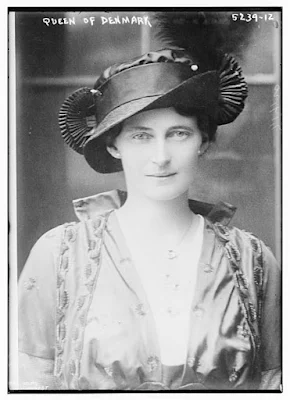Alexandrine was born a Duchess of Mecklenburg-Schwerin on 24 December 1879 in the city of Schwerin, the capital of the vast Grand Duchy of Mecklenburg- Schwerin in Northern Germany.
Family
Her father was Frederick Francis, Hereditary Grand Duke of Mecklenburg-Schwerin; who was the eldest son of and heir to the reigning Grand Duke Frederick Francis II. Her mother was Grand Duchess Anastasia Mikhailovna of Russia, who was a granddaughter of Emperor Nicholas I of Russia.
Alexandrine was her parents' first child, and was born eleven months after their wedding in St. Petersburg. She was born in the Neustädtisches Palais in Schwerin, which was her parents' residence in the city at the time.
Alexandrine had two younger siblings: her only brother was Duke Frederick Francis, who in 1897 succeeded their father as Grand Duke of Mecklenburg-Schwerin, and her only sister was Duchess Cecilie, who in 1906 married the German Crown Prince Wilhelm of Prussia, eldest son of
German Emperor William II.
She was also a paternal first cousin of Juliana of the Netherlands. Her mother was the paternal aunt of Princess Irina Alexandrovna of Russia, the wife of Felix Yusupov, one of the murderers of Rasputin.
Holiday
The family spent their time at the Castle in Schwerin but also at Lake Geneva, in Palermo, Baden-Baden and Cannes in the south of France. At that time Cannes was favoured by European royalty, including Empress Eugénie of France and King Edward VII of the United Kingdom.
Love and Marriage
During the winter visit of 1897 in Cannes, Duchess Alexandrine met her future husband, Prince Christian of Denmark, the eldest son of Crown Prince Frederick and Crown Princess Louise of Denmark.
On 24 March 1897, the two young royals were engaged in Schwerin . In April 1897, her father the Grand Duke suddenly died at the age of 46 years old. His death was shrouded in mystery as it was first reported that he had committed suicide by throwing himself off a bridge. However he died during a bout of shortness of breath.
On 26 April 1898, Prince Christian and Duchess Alexandrine married at Cannes. She was 18 years old then. They would have had 2 children.
Duty
The couple lived in Christian VIII's Palace at the Amalienborg palace complex in central Copenhagen. On 28 January 1906, King Christian IX of Denmark died. Christian himself became Crown Prince and Alexandrine Crown Princess.
On 14 May 1912, King Frederick VIII, Christian's father died suddenly in Hamburg, Germany while returning from a recuperation stay in Nice in Southern France.
Christian acceded to the throne as Christian X and Alexandrine became Queen consort of Denmark. She is not considered to have played a political role, but she is described as being a loyal support to her spouse.
She was interested in music. She was known for her needlework, which she sold for charitable purposes. She enjoyed golf and photography.
The revolution in Russia brought much heartbreak for Alexandrine as three of her uncles, Nicholas, George and Sergey, were killed by the Bolsheviks. As if that was not enough she survived the 1918 flu pandemic.
World War II
The royal couple became very popular as national symbols during the World War II occupation. Her rejection of General Kaupisch on 9 April 1940 was a symbol for her loyalty toward Denmark before her birth country Germany.
It was reported that although Alexandrine was seen as shy and disliked official ceremonies she had a sharp intelligence. She was together with her daughter-in-law, Ingrid of Sweden a true support of the monarch and a driving force for the resistance toward the occupation within the royal house.
The Queen and the Crown Princess never lost their calm when the nation was attacked.
Kaj Munk (Danish writer) was quoted:
"Protect our Queen, the only German we would like to keep!"
Later life and death
Alexandrine of Mecklenburg-Schwerin, Queen of Denmark, became the first queen Dowager of Denmark to opt not to use that title. She died in Copenhagen on 28 December 1952 and is interred next to her husband in Roskilde Cathedral.
Source picture: Wikipedia








Comments